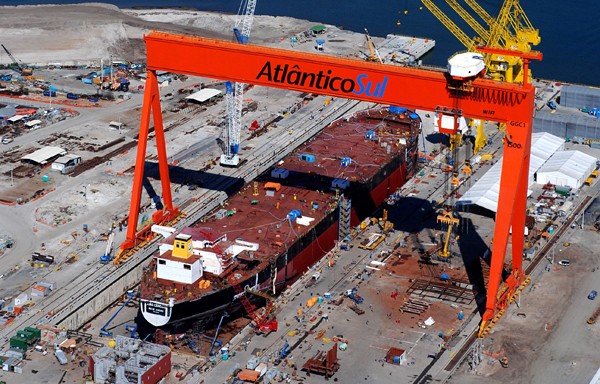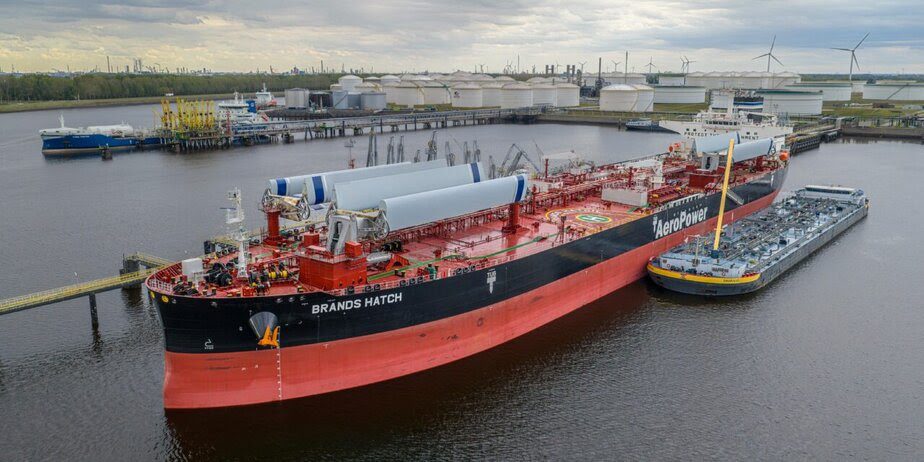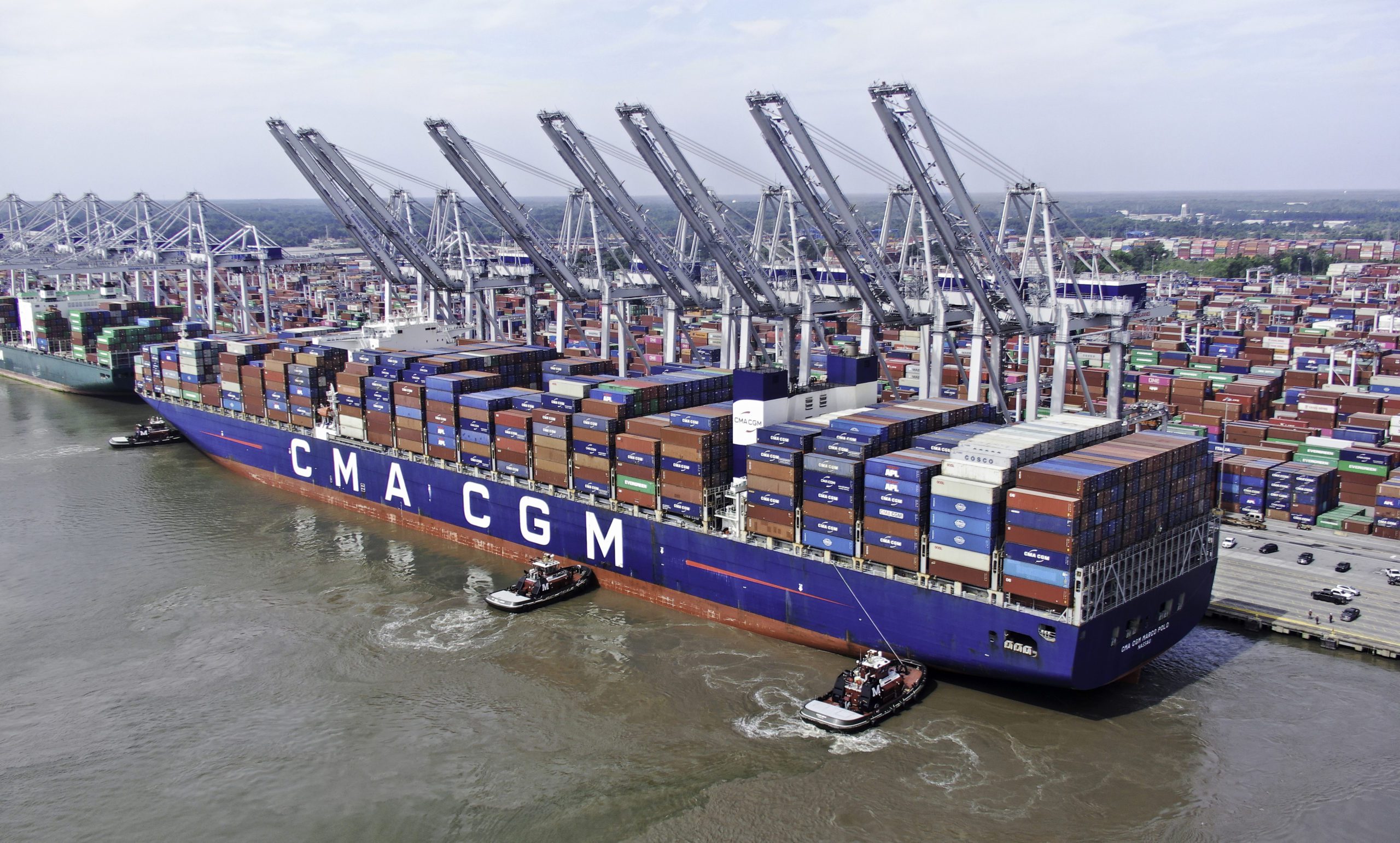The MT João Cândido, the first in a series of ten 160, 000 dwt Suezmax tankers for Transpetro, under construction at Atlântico Sul Shipyard. In March, the ship had to return to the yard after experiencing problems with listing and welds, a major problem considering its delivery to Transpetro was already behind schedule. Photo: Petrobas
(Bloomberg) — OSX Brasil SA, the shipbuilder controlled by Brazil’s richest man, stands to benefit from a rival’s failure to deliver vessels on time for offshore oil production. So do the company’s plunging shares.
Eike Batista’s OSX is among companies vying to sell oil tankers and other ships to Petroleo Brasileiro SA as Brazil’s state-owned oil company seeks to more than double output of crude by 2020. Until now, OSX has principally supplied Batista’s own production company, OGX Petroleo & Gas Participacoes SA.
Petrobras, as the oil company is known, in April suspended a 16-tanker contract with Estaleiro Atlantico Sul SA, which delivered its first ship 21 months late and lost its construction technology partner in March. That opens the field for OSX, said Luiz Broad, an analyst at Agora Corretora.
A major vessel contract with Petrobras “would be very positive,” Broad said in a telephone interview from Rio de Janeiro. “It would have immediate effect on the shares.”
OSX shares have dropped 68 percent since their March 22, 2010 initial public offering, compared with a 22 percent decline for the benchmark Bovespa Index. The shares have suffered from the production company’s failure to meet its own forecasts on timetables and levels of oil production.
The OSX shipyard is under construction in Sao Joao da Barra in northern Rio de Janeiro state and will be the biggest in the Americas, according to the company’s business plan. It is scheduled to launch its first domestically built Floating, Production, Storage and Offloading vessel, or FPSO, in 2014. Last year OSX delivered to OGX a vessel of the same type built in South Korea, and two others are under construction in Singapore.
Local Content
Under former President Luiz Inacio Lula da Silva, the Brazilian government created rules that require oil producers to acquire locally made equipment in an attempt to develop industries ranging from shipyards to oil service providers. Batista created OSX in 2009 to profit from the rules while also supplying OGX, his oil company.
OSX, based in Rio de Janeiro, is in talks to become a supplier of drilling rigs and support vessels for Petrobras, Luiz Carneiro said in May, before he moved from being chief executive officer of OSX to the same post at Rio-based OGX. The shipbuilder in March announced a contract to construct 11 oil tankers for London-based Kingfish Trading Ltd.’s Brazilian unit for $732 million.
“Talks continue for the construction of rigs and are advanced,” OSX said in an e-mailed response to questions about possible deals with Petrobras. “Talks also reflect the diverse business opportunities that exist in the Brazilian oil and gas market in which OSX participates: leasing of off-shore production units, shipbuilding and operating services.” OSX has no current contracts with Petrobras, the company said.
American Shipyards
Batista’s shipbuilding arm isn’t the only potential beneficiary of delays at local yards. U.S. shipbuilders Tidewater Inc. and Hornbeck Offshore Services Inc. and rig suppliers Transocean Ltd. and Noble Corp. could also step in, according to James West, an analyst at Barclay’s Capital.
“The rig count is ramping up so they need more vessels to support all the expansion,” West said in a June 29 phone interview from New York. “There are more and more vessels heading into Brazil every year. There’s a lot of competition in Brazil with local providers, and OSX will obviously be one of those.”
Petrobras intends to take its total vessel count to 578 in 2020 from 280 in 2010, according to West.
As for EAS, the tanker company whose contract was suspended, Petrobras fined it for the delays and gave it until Aug. 30 to find a new partner.
New Partner
South Korea’s Samsung Heavy Industries Co. quit the EAS partnership in March. While EAS has informed Petrobras’s transportation unit that it has signed an agreement with a new technological partner from Japan, the shipbuilder must comply with further conditions before the suspension is lifted, Transpetro, the shipping unit, said in an e-mailed response to questions.
EAS’s new technology partner is Tokyo-based IHI Marine United Inc., the shipbuilder’s external press office said in an e-mailed statement. The press office referred questions on the Transpetro contract to Transpetro.
The Petrobras unit plans to acquire 49 new tankers by 2016 as the parent plans to boost output to about 5.7 million barrels a day in 2020 from 2.4 billion in 2011. The company, Latin America’s largest by market value and producer of 93 percent of Brazil’s oil in May, seeks to increase output in Brazil to about 4.9 billion barrels from the current 2.02 billion as it taps so- called pre-salt reserves.
Salt Layer
Trapped under a layer of salt beneath the Atlantic seabed as far as 300 kilometers from the Rio de Janeiro coastline, the at least 50 billion barrels of pre-salt deposits discovered in 2007 are the biggest discovery in the Americas since Mexico’s Cantarell field was found in 1976. Spain’s Repsol SA, Portugal’s Galp Energia SGPS SA and the U.K.’s BG Group Plc also have stakes in pre-salt fields off Brazil.
“OSX’s original business plan, and what the markets take into account, is that they would only supply OGX,” said Jose Luiz Garcia, a portfolio manager at Rio de Janeiro-based investment fund Mercatto Gestao de Recursos. “Any orders it gets from others parties will be positive for OSX. Given the share price, I don’t think the market is considering that possibility.”
By Rodrigo Orihuela (c) 2012 Bloomberg.

 Join The Club
Join The Club











